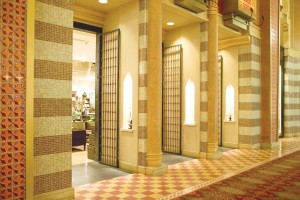The Best Tile for Floors, Walls, and Backsplashes
Learn how different tile bodies compare for use in different areas of your home or business.
 Are you planning a tile project? Whether you’re remodeling a room or designing a brand new home or business, the color, pattern, and design of your tile is no doubt a top concern. But don’t forget to also consider the more practical aspects of your tile selection. Some types of tile bodies are more suited to different applications like floors, walls, and backsplashes than others.
Are you planning a tile project? Whether you’re remodeling a room or designing a brand new home or business, the color, pattern, and design of your tile is no doubt a top concern. But don’t forget to also consider the more practical aspects of your tile selection. Some types of tile bodies are more suited to different applications like floors, walls, and backsplashes than others.
Here’s a basic overview of your options:
Ceramic Tile
- Composition: Ceramic tiles are made from clay, fired at high temperatures, and then fired again with various colored glazes to create a hard, stain-resistant, scratch-resistant finish.
- Cost: Ceramic tiles may cost anywhere from $2 to $7 or more per square foot, depending on the quality and complexity of any designs painted or stamped on the tile.
- Pros: This type of tile is affordable, easy to install, and will give you plenty of design options for walls and backsplashes. There is a tremendous variety of ceramic tiles to choose from, ranging from solid color tiles to hand painted designer tiles.
- Cons: Though ceramic tile is durable, it is often not suitable for high-traffic areas such as commercial floors.
Porcelain Tile
- Composition: Porcelain tile is a type of ceramic tile made with a higher-quality clay and fired at a higher temperature. This makes it denser and less porous. Porcelain tiles can be finished with traditional glazes or with new techniques that create highly realistic faux finishes like stone or wood.
- Cost: Porcelain tile is usually priced similarly to ceramic tile, at $3 to $7 or more per square foot.
- Pros: Because it is denser and less porous, porcelain tile provides better impact resistance and stain resistance than ceramic tile, making porcelain tile an ideal choice for floors. It is available in a wide variety of styles and sizes.
- Cons: Porcelain tile can be tricky to install because it requires a special setting material. To make sure you get the right material, work with a pro for your tile installation.
Glass Tile
- Composition: Glass tiles are of course made from glass. Larger format glass tiles are sold individually while smaller ones are typically sold in mosaic squares attached to a mesh backing.
- Cost: Glass tile starts around $7 per square foot and can get as high as $30 per square foot.
- Pros: Glass has a translucent and reflective look that is very useful for bringing light and color into small rooms. It comes in a wide range of colors and mosaic patterns.
- Cons: With very few exceptions, glass tile is not suitable for use one floors because it is both fragile and slippery. It must be installed with great care to prevent marks in the setting compound from showing through the translucent tiles.
Cement Tile
- Composition: Cement tiles are made by pouring colored cement into special forms. Because they are not glazed, they have a more matte look rather than a shiny look, though they can be sealed to provide shine if you like.
- Cost: The average cement tile can range from $9 to $17 per square foot.
- Pros: Cement tiles are extremely resilient. Because the colored design goes all the way through the tile rather than just being painted on top, you don’t have to worry about chips ruining your design. Most cement tiles feature bold, colorful patterns that are very attractive on large floors.
- Cons: Cement tiles are thick and heavy, which presents challenges for use on walls or backsplashes. Plus, they may be vulnerable to etching by acids or harsh detergents if they are not sealed.
Come Shop at Mission Tile West
If you would like to learn more about designer tile options for your home or business, please come visit one of our showrooms today.
